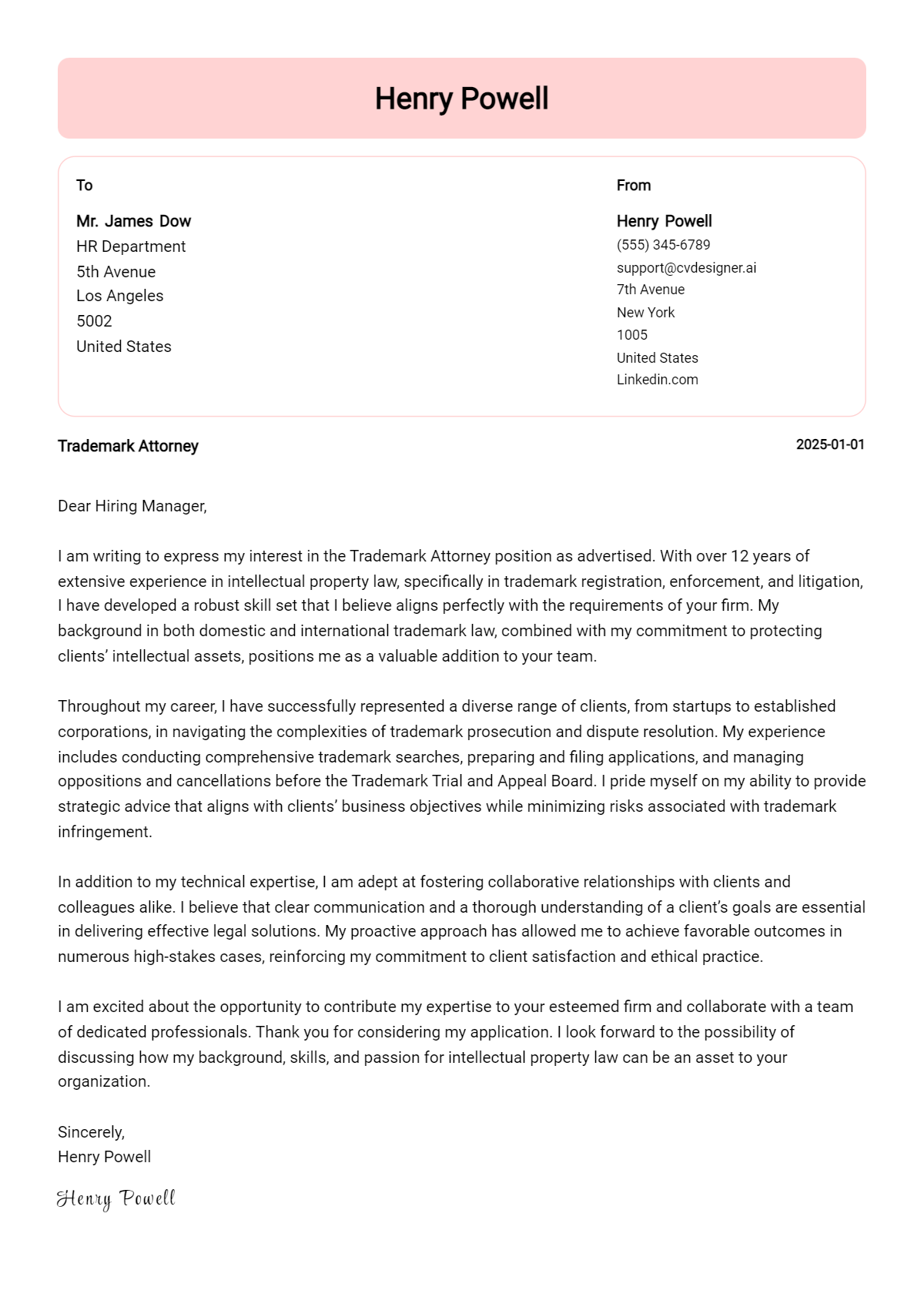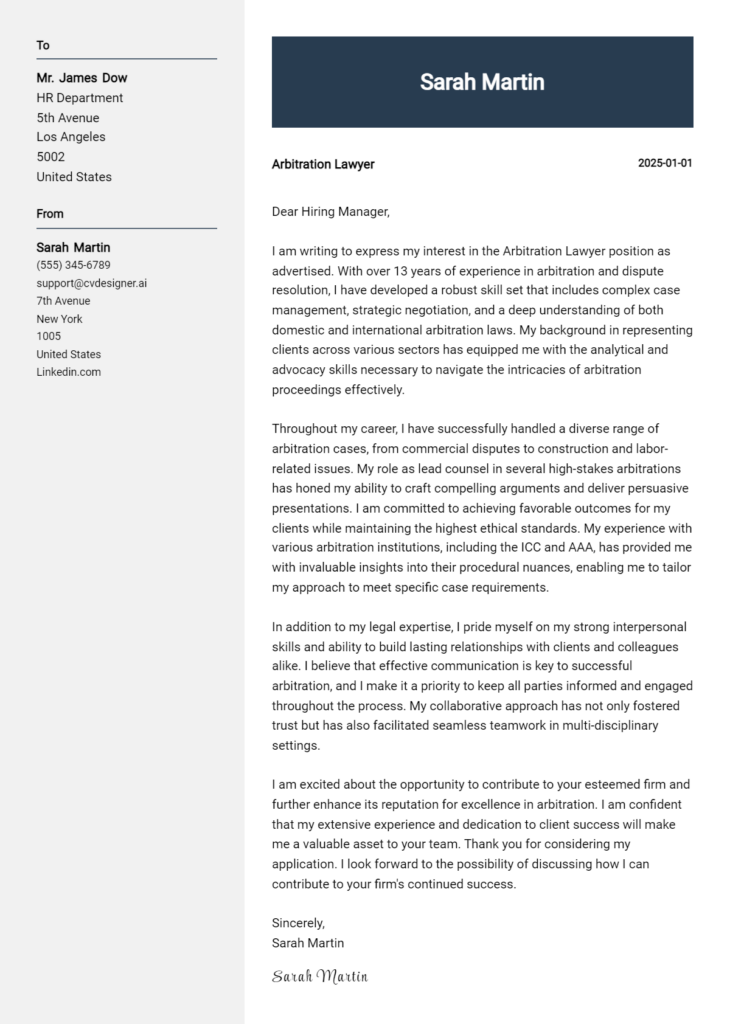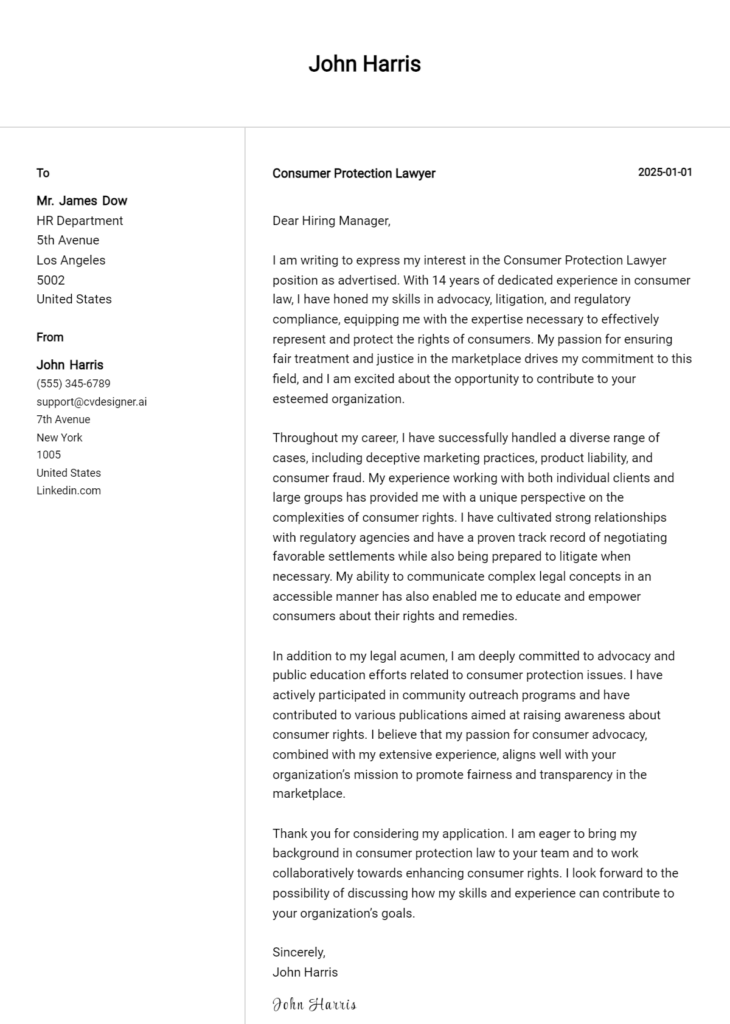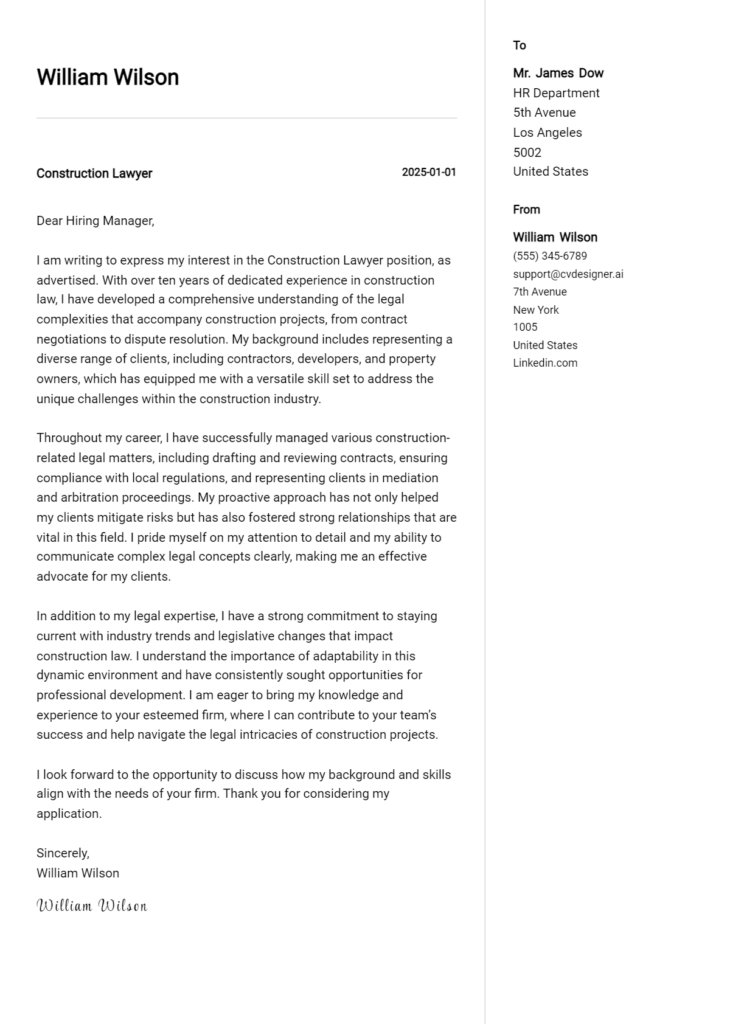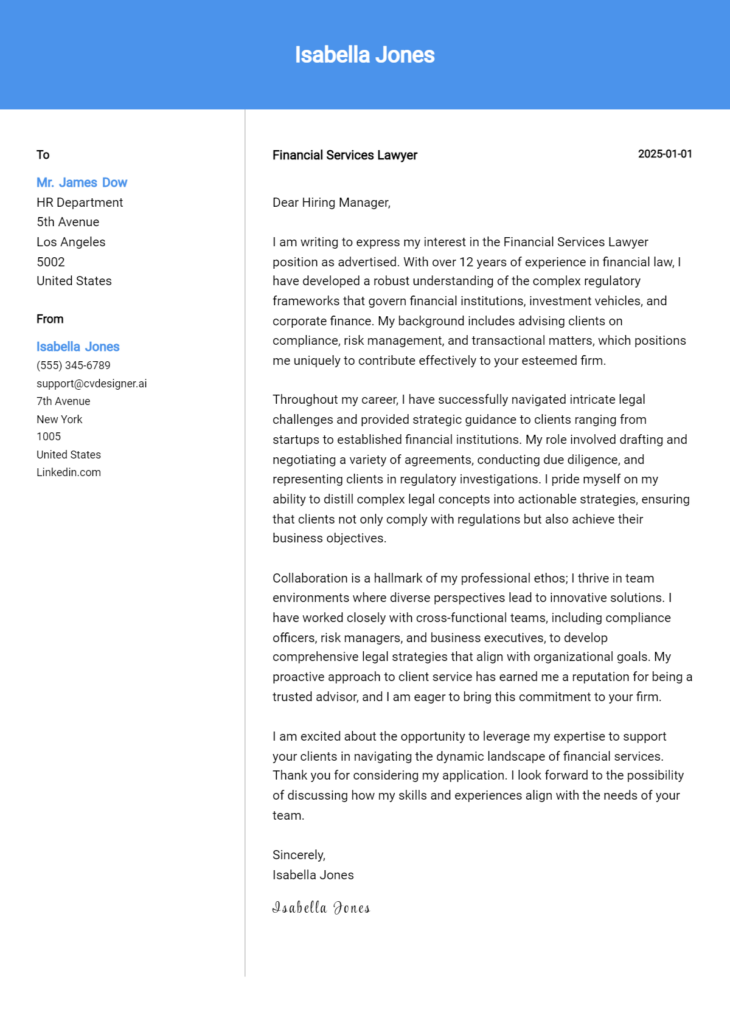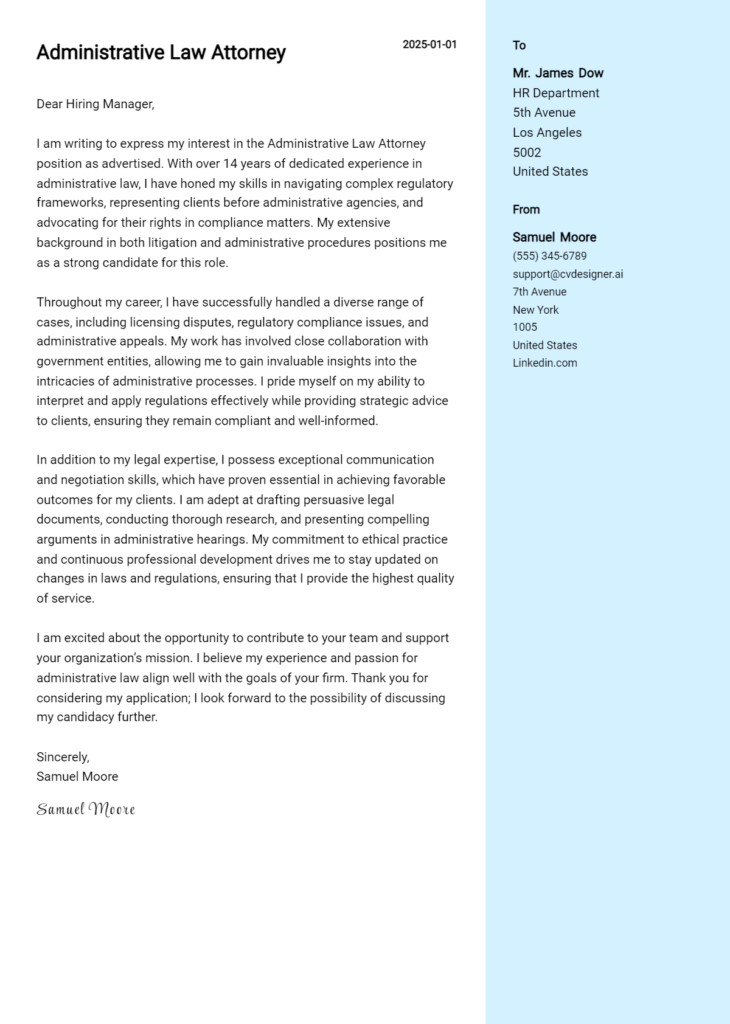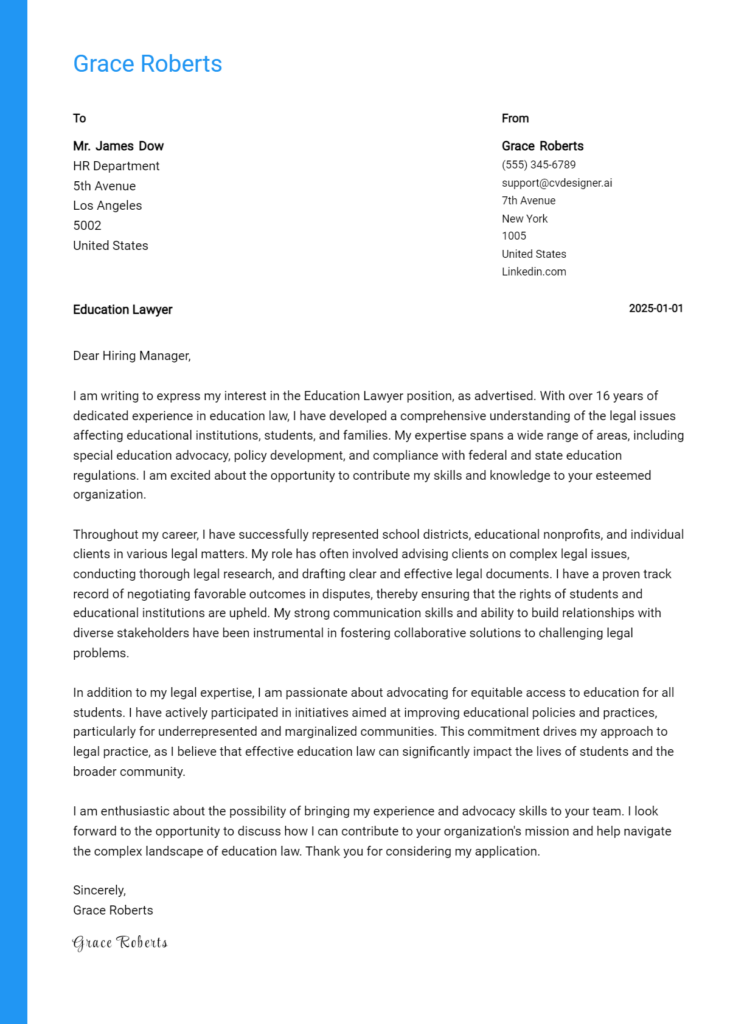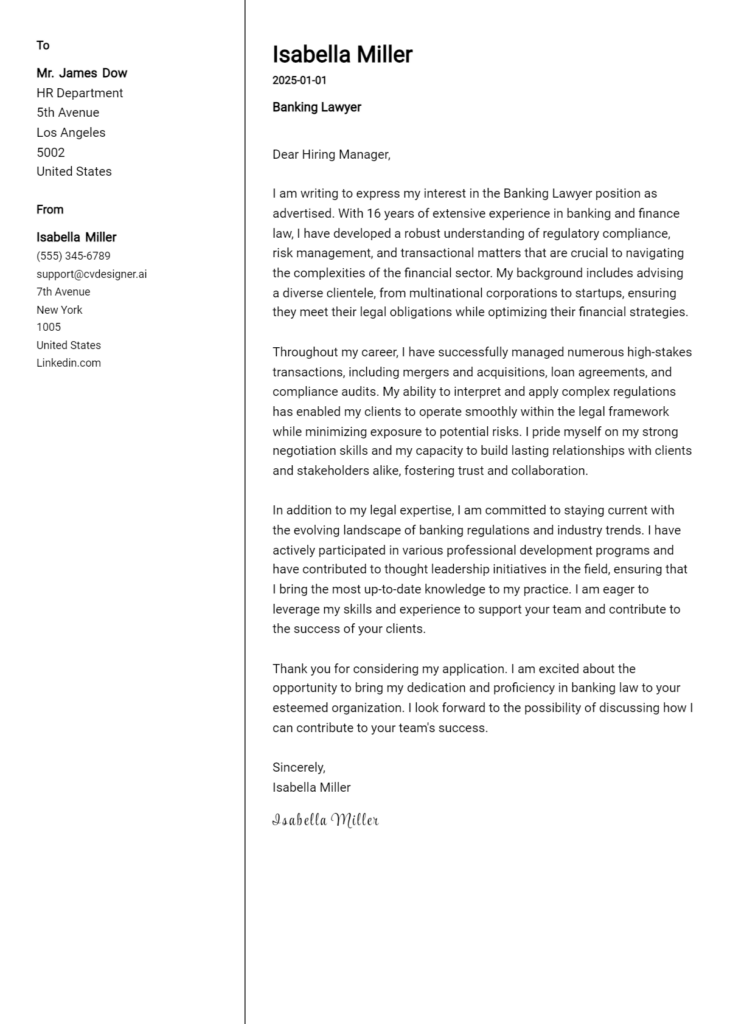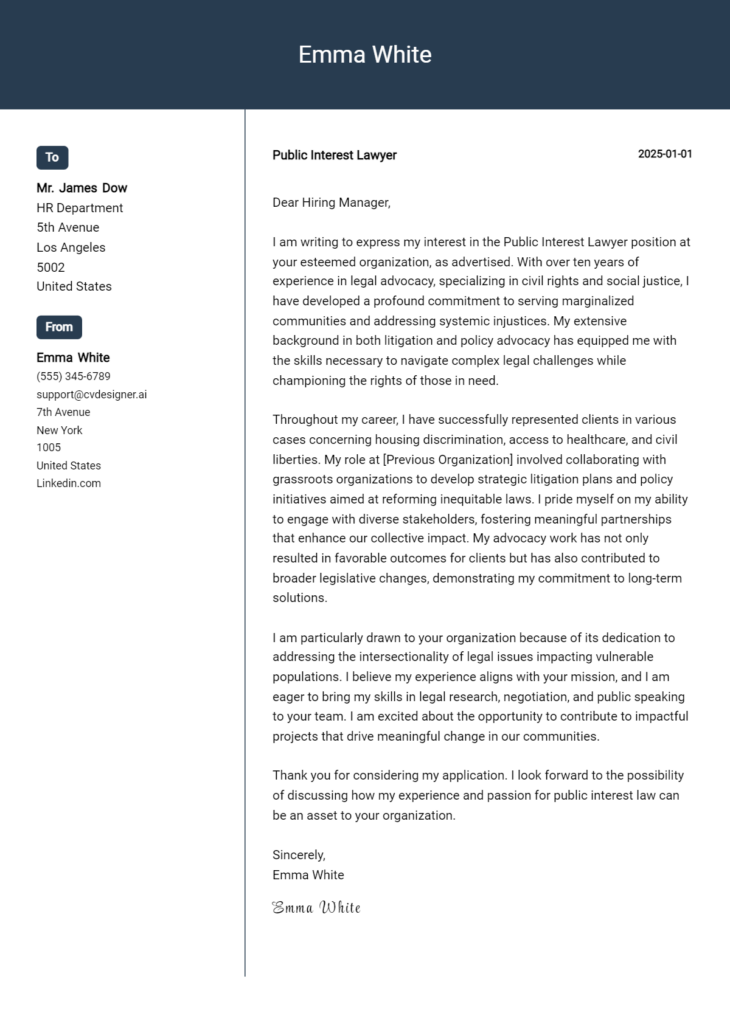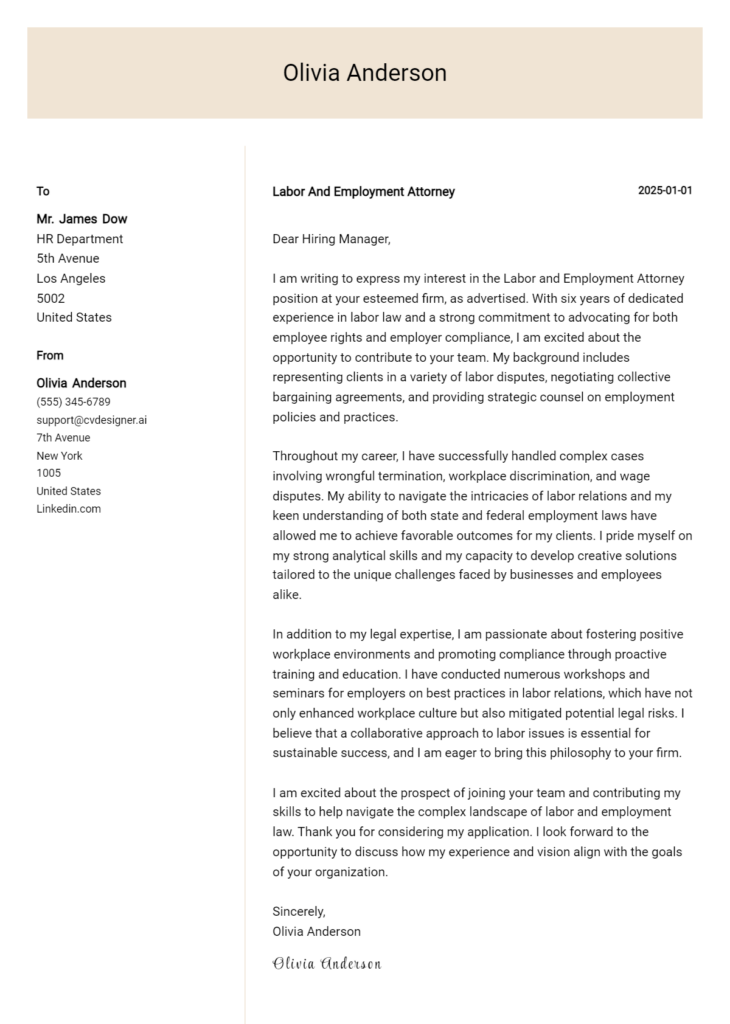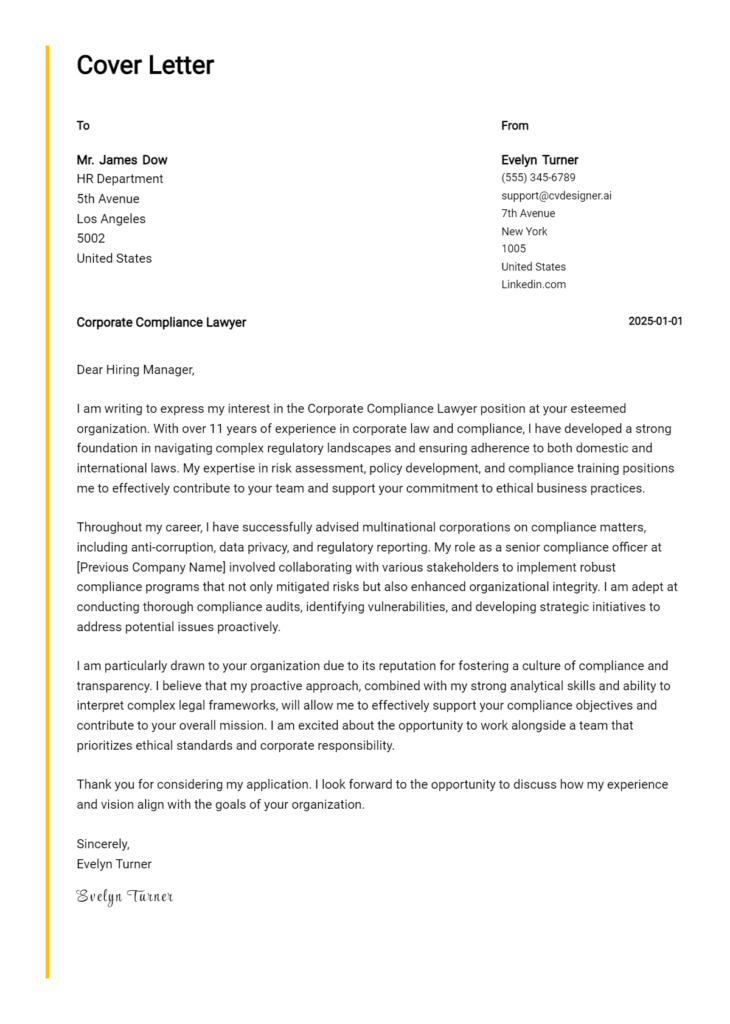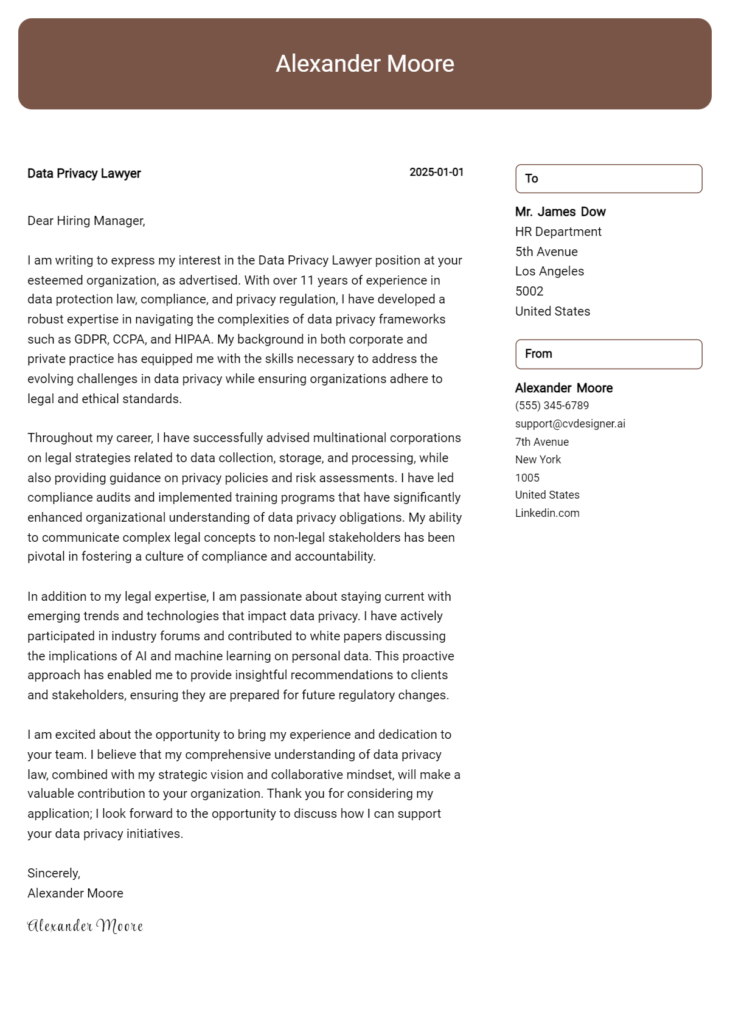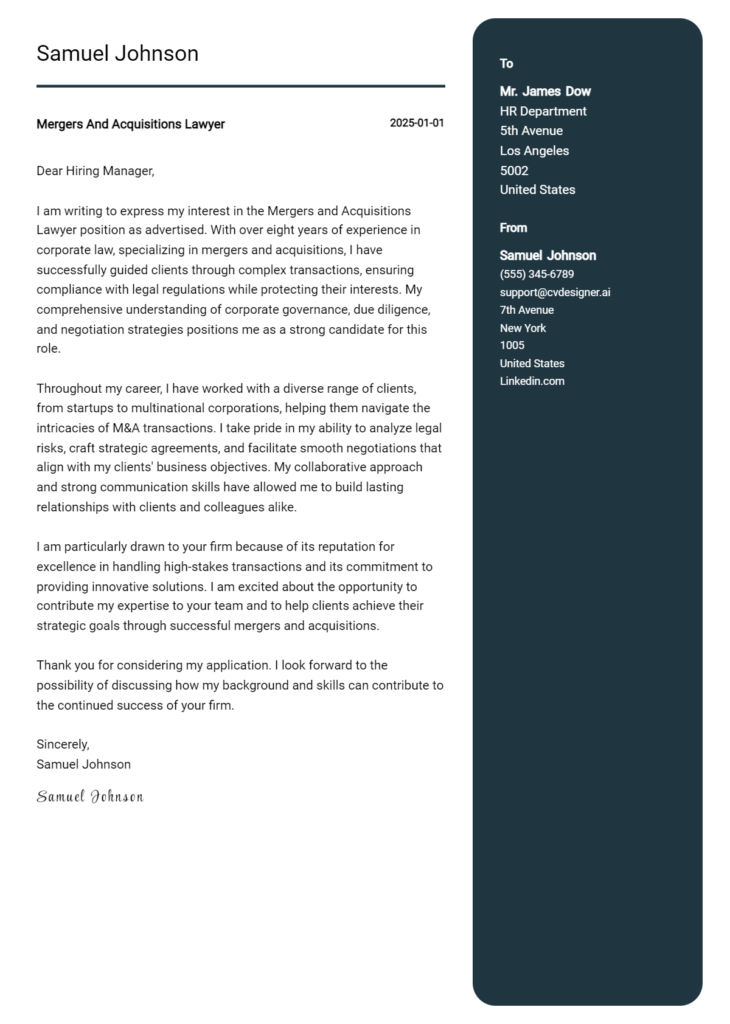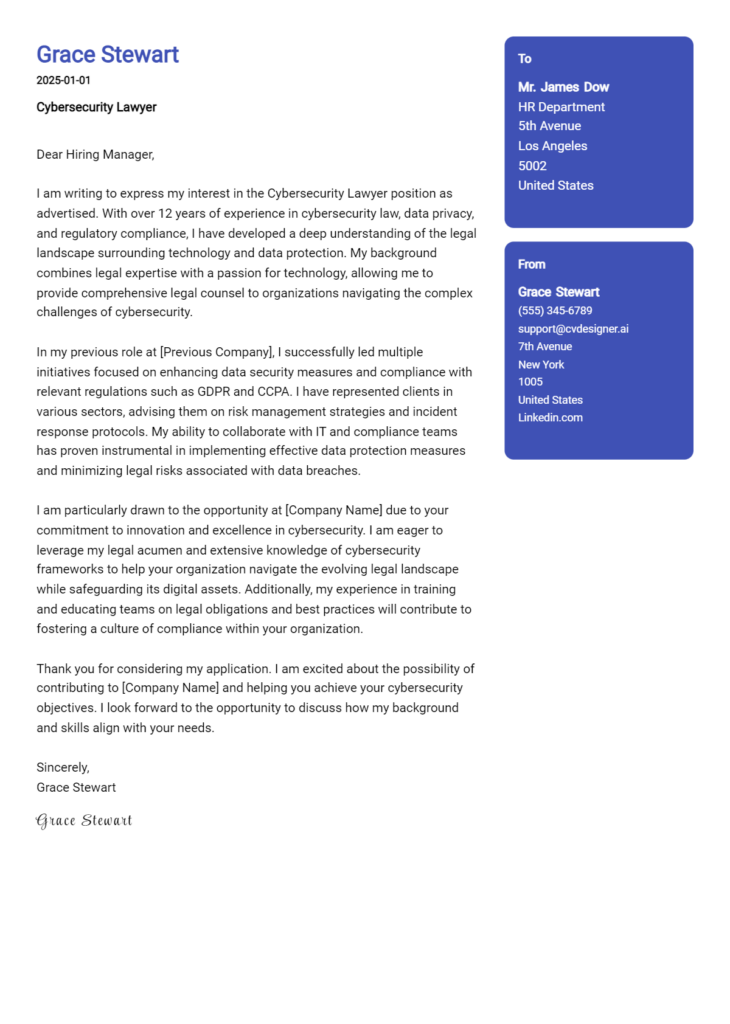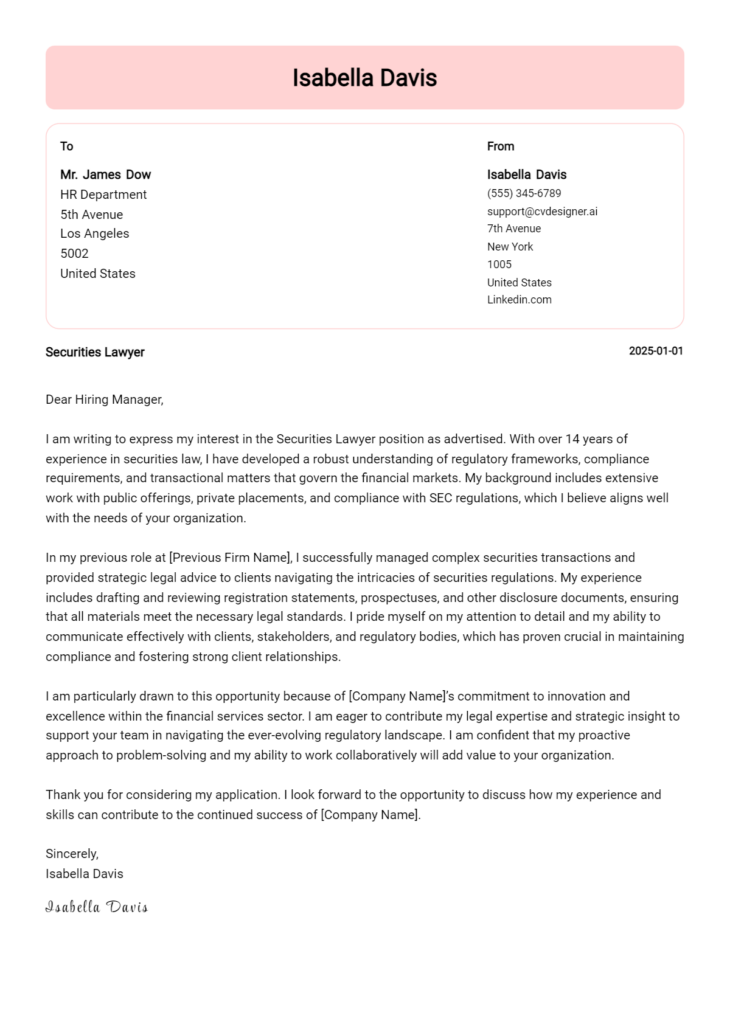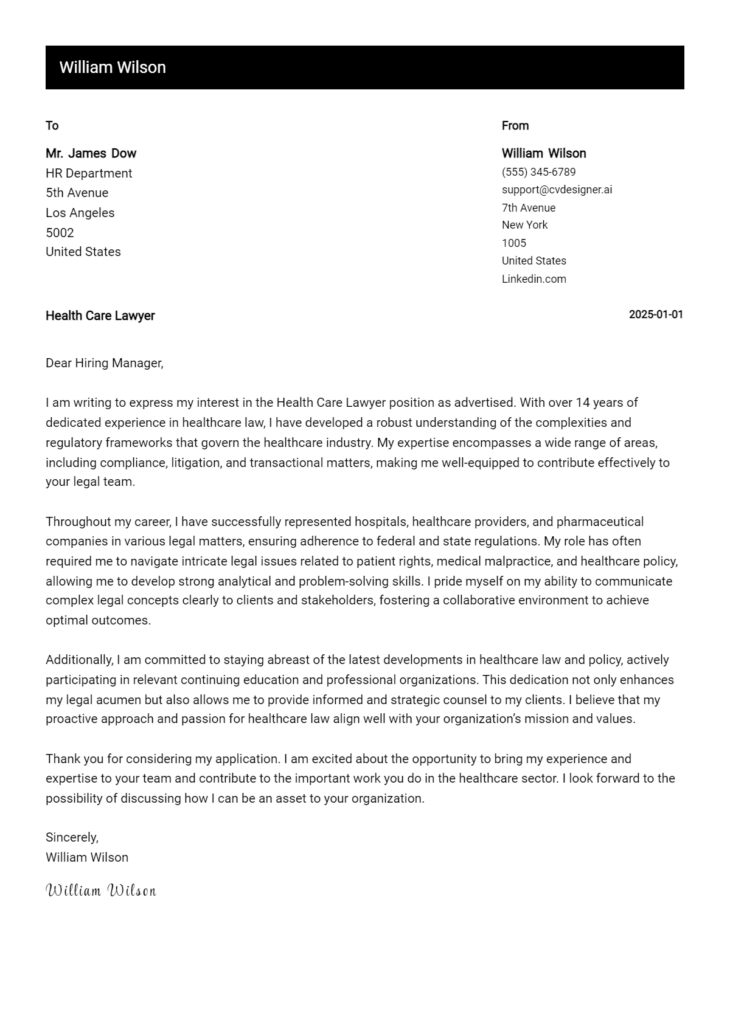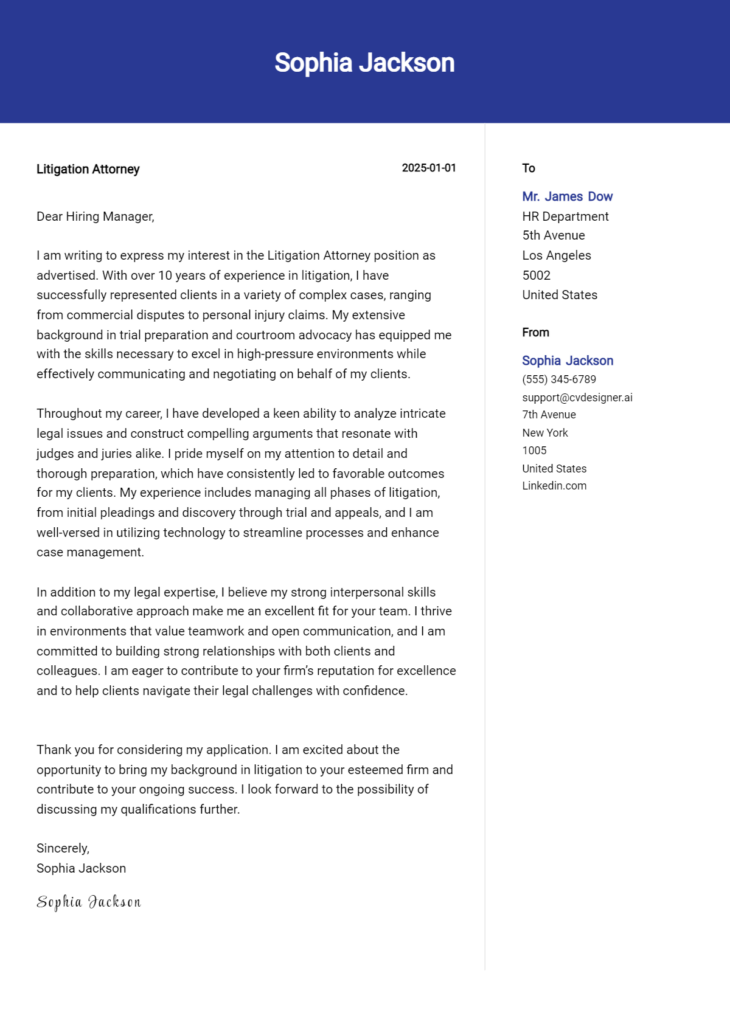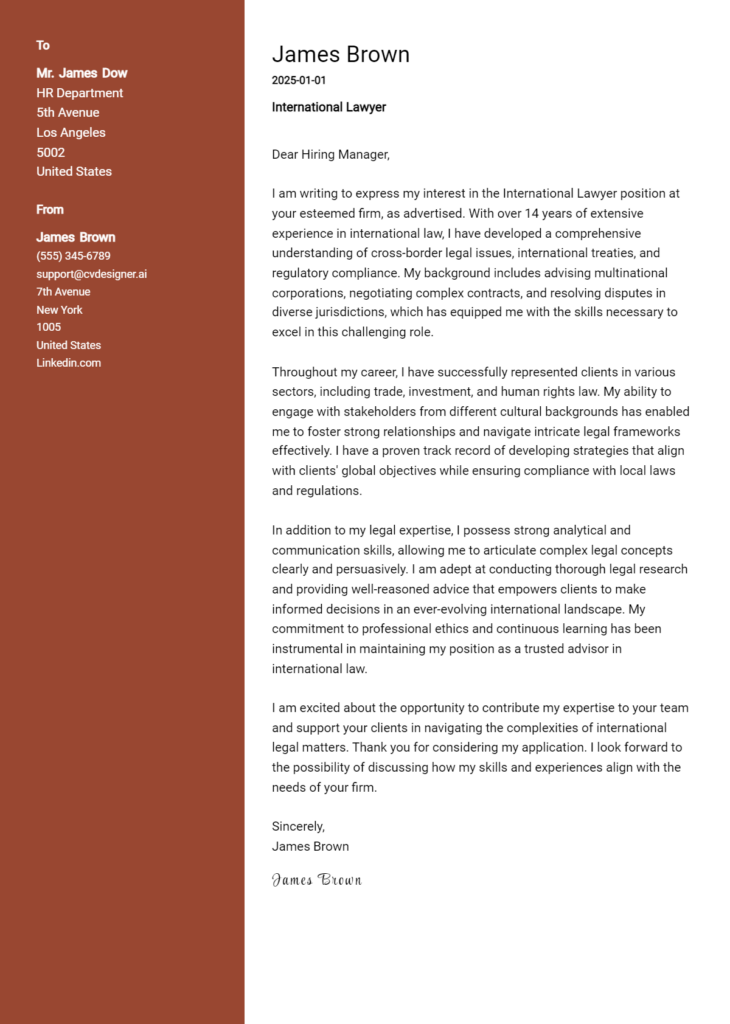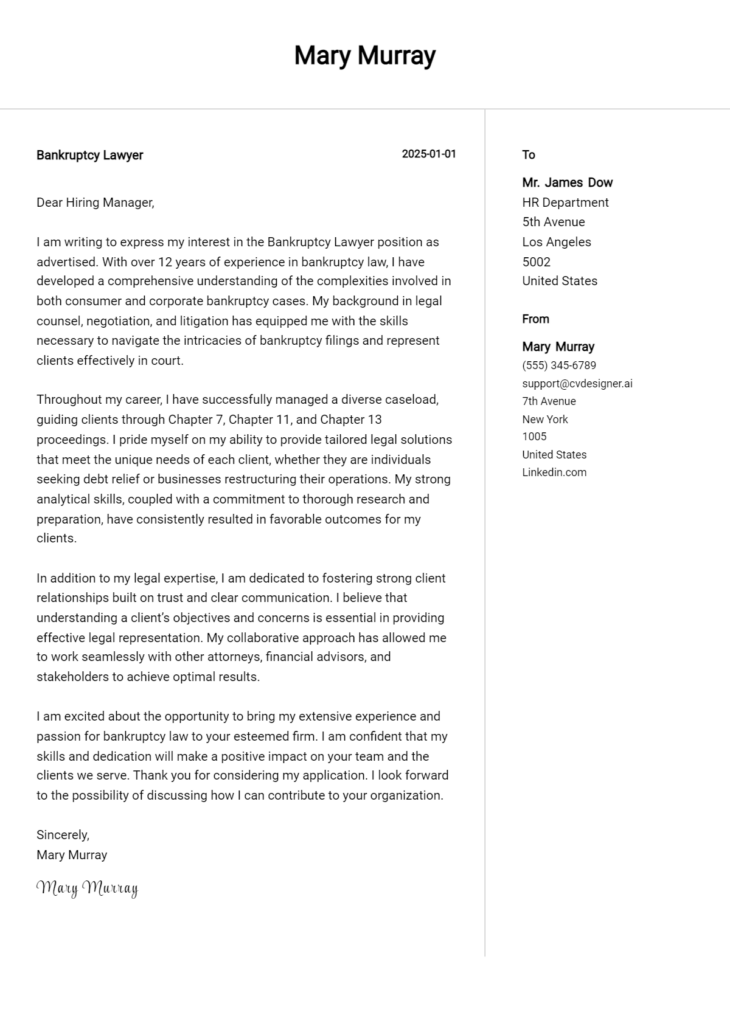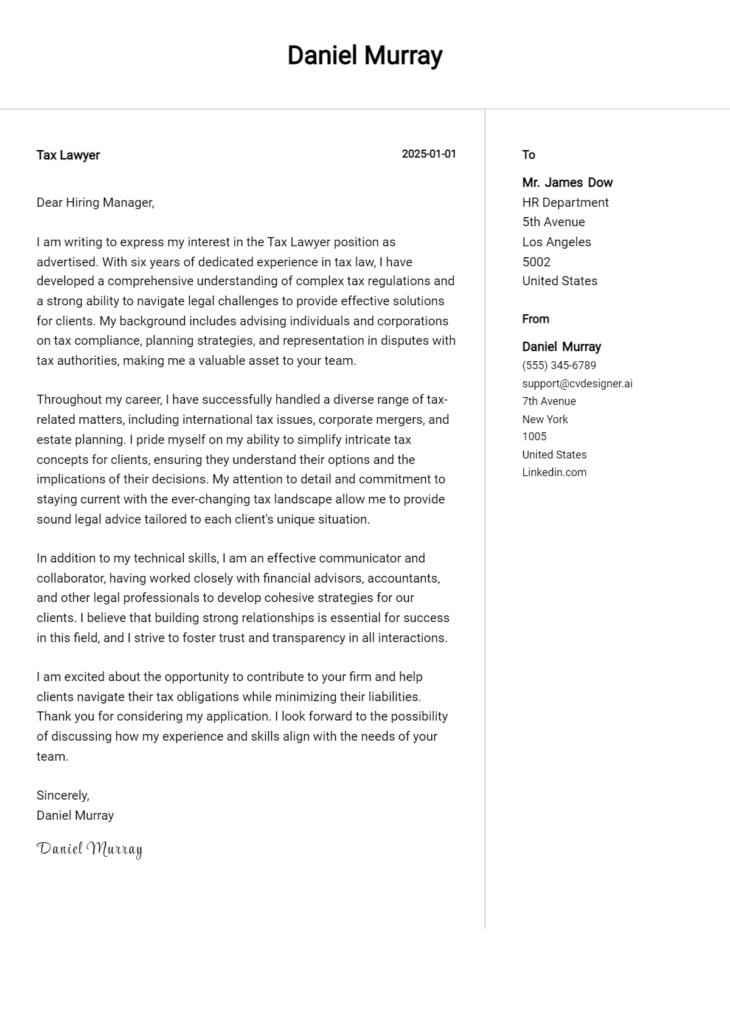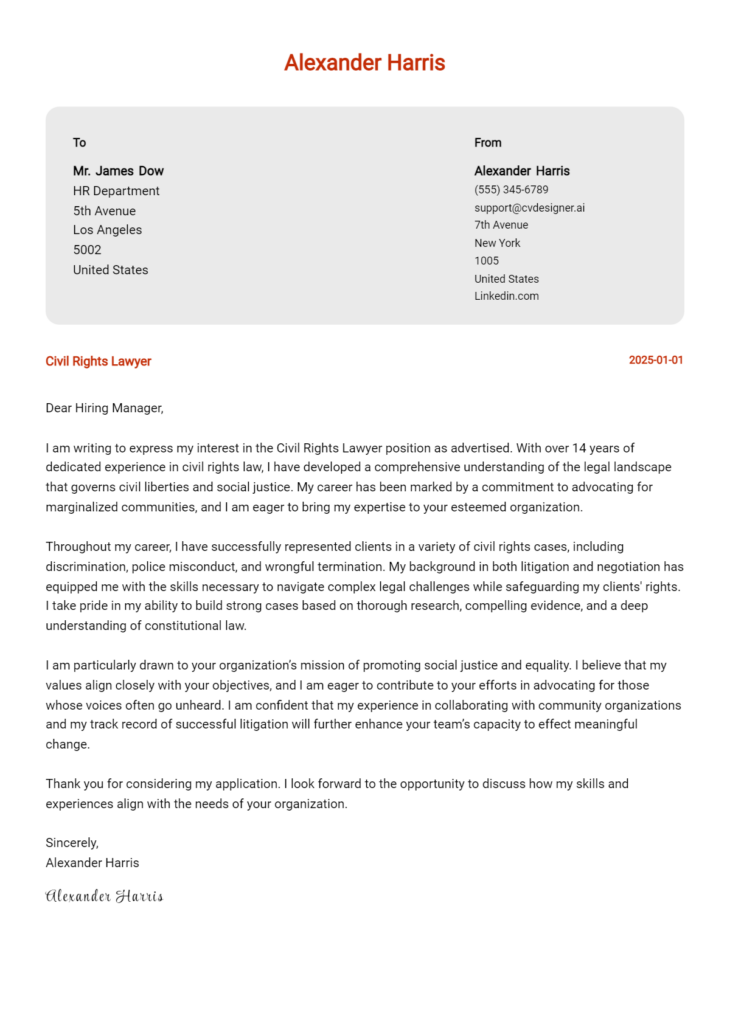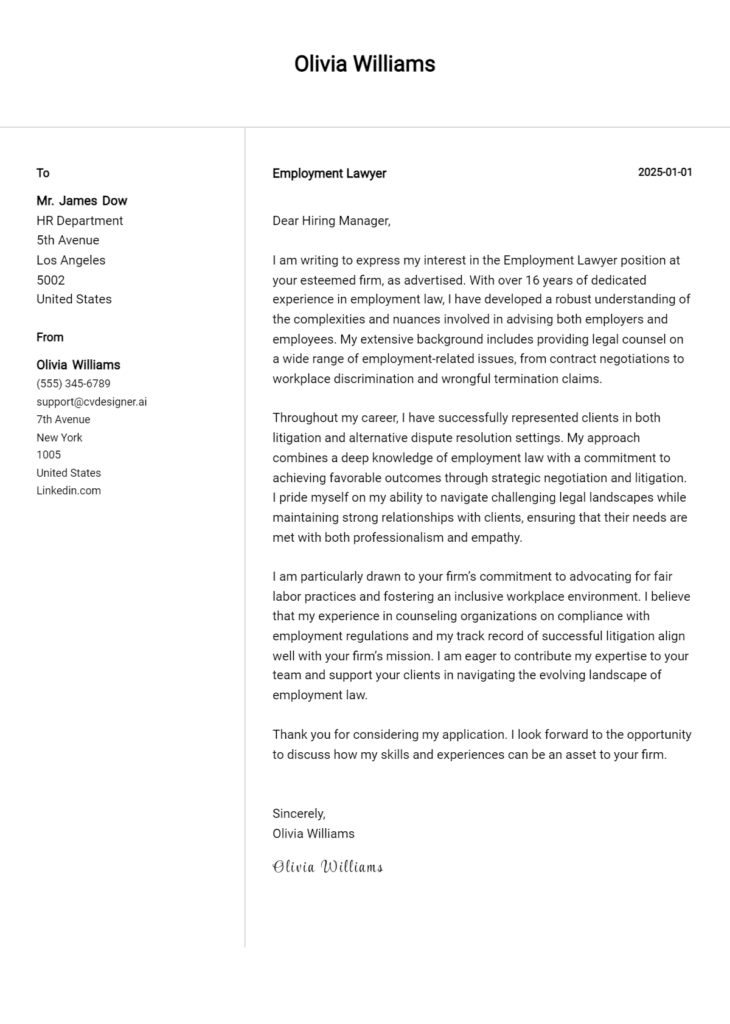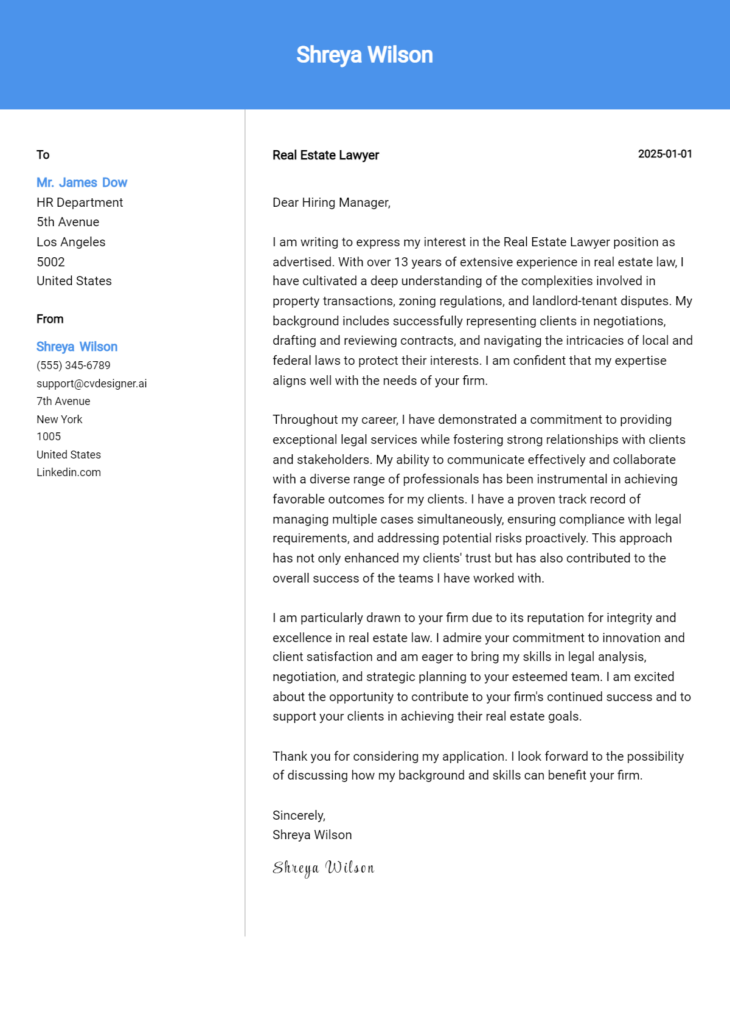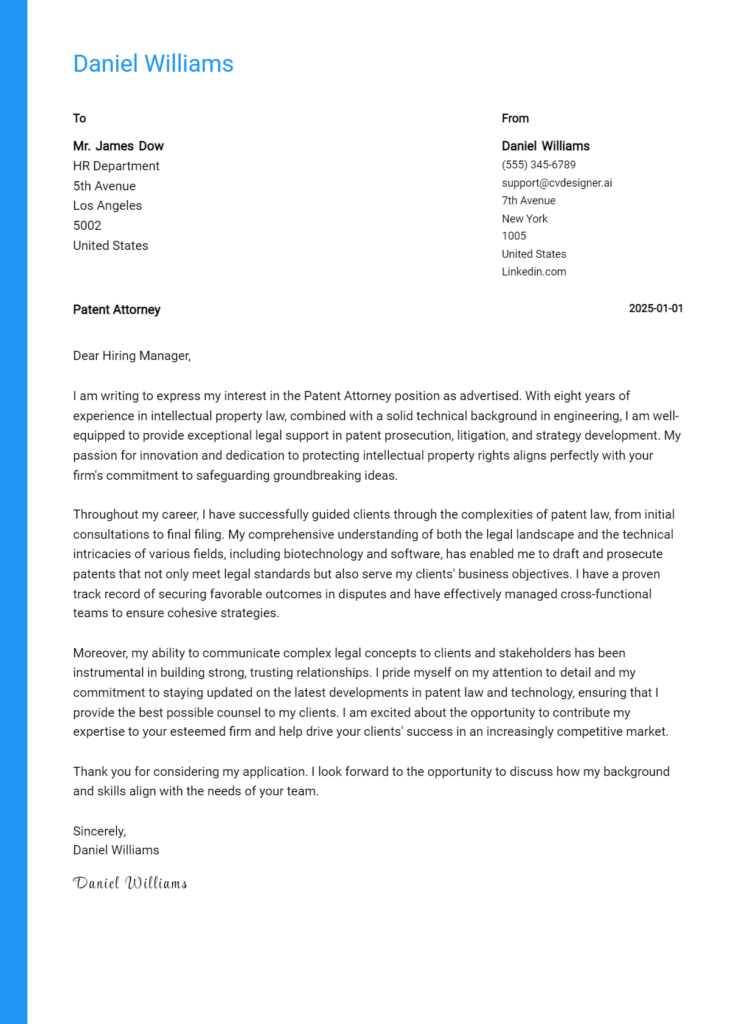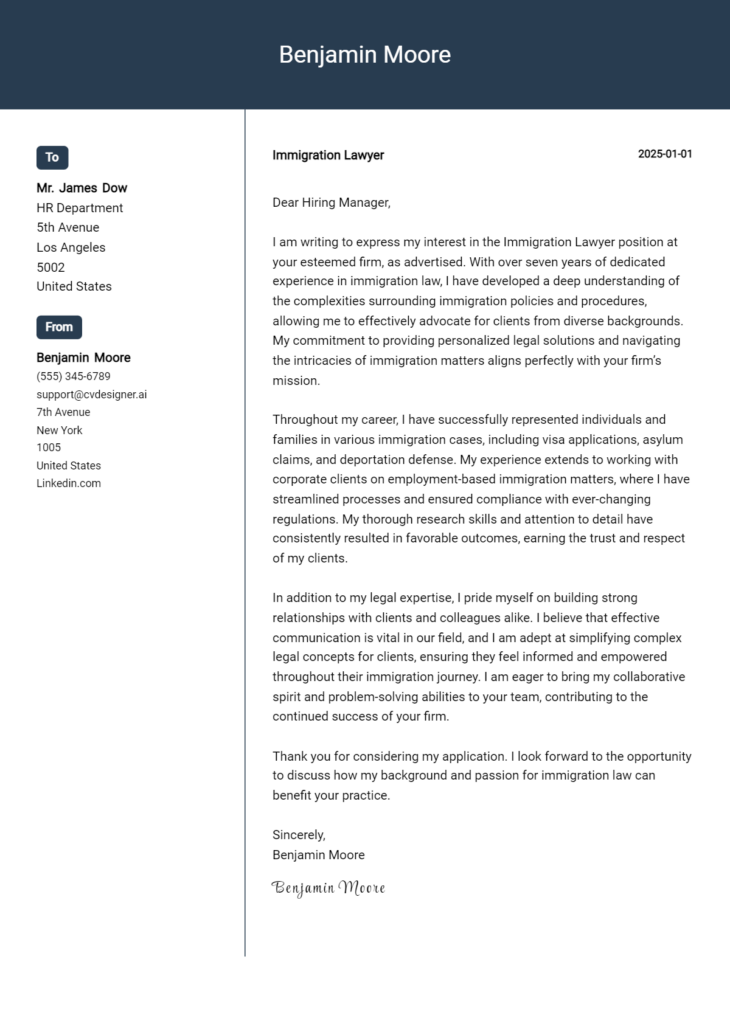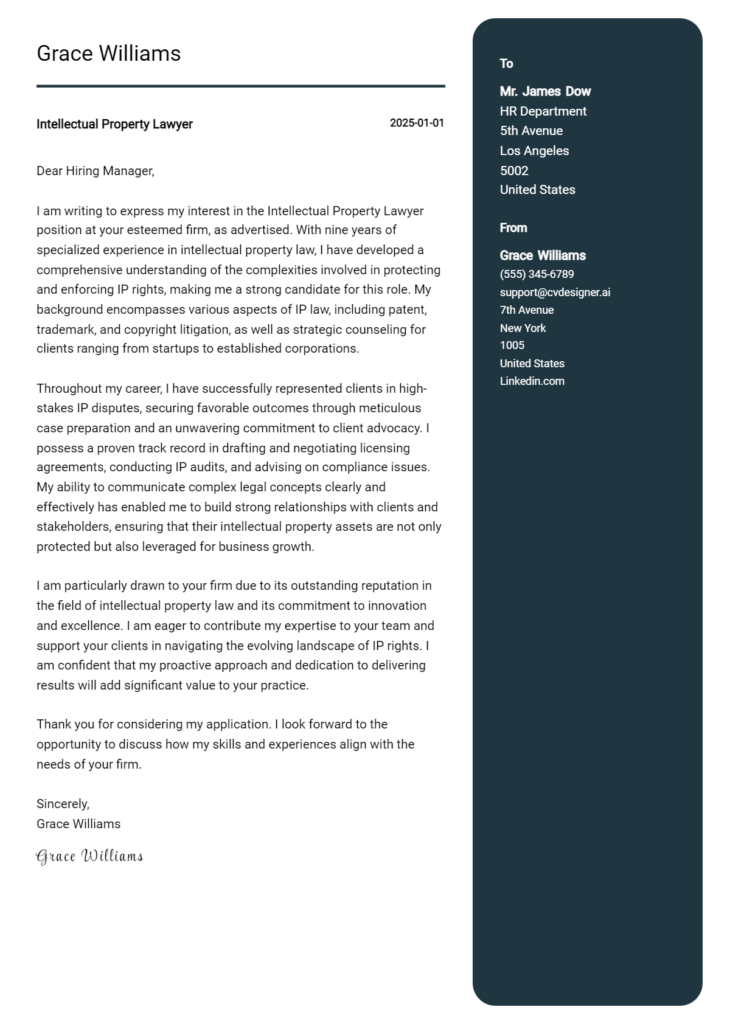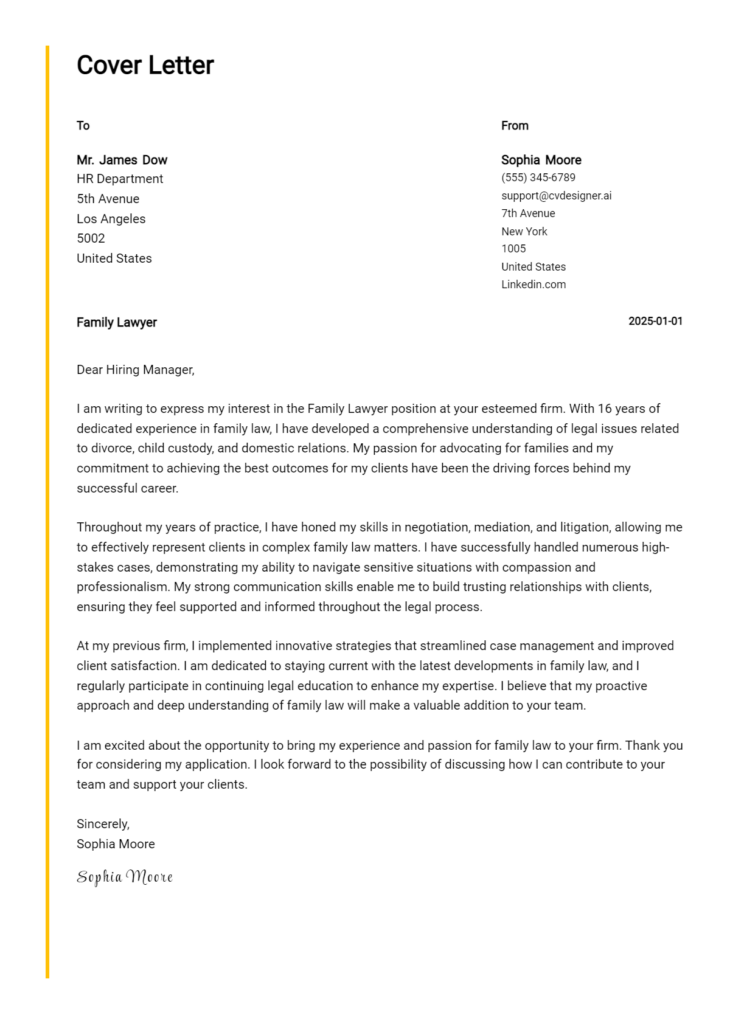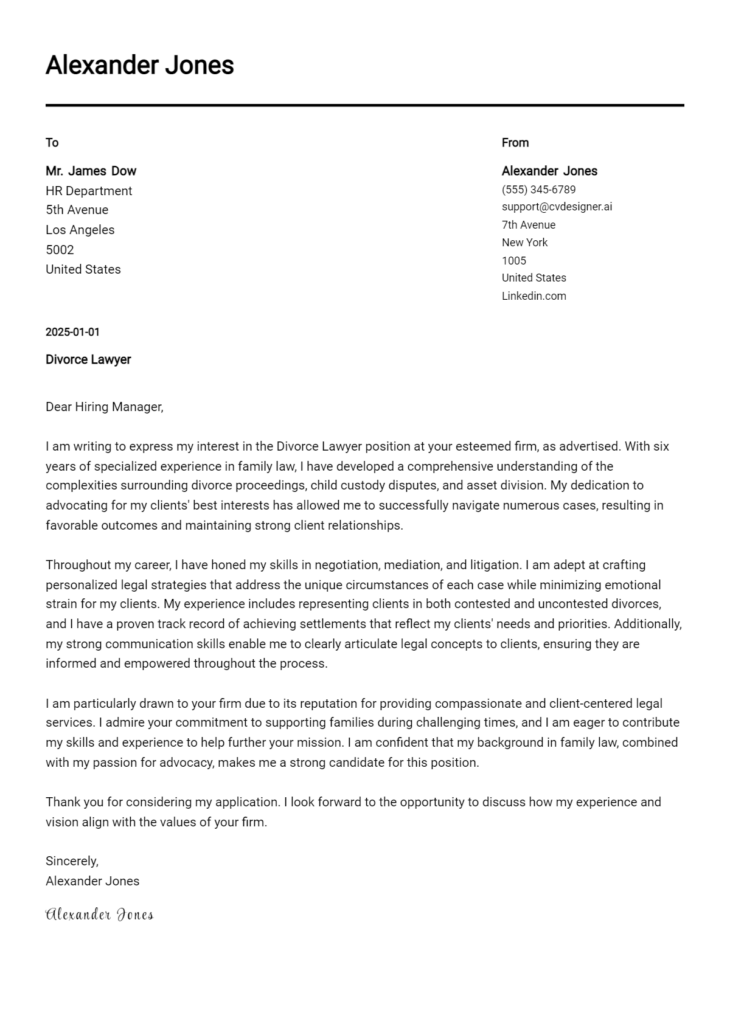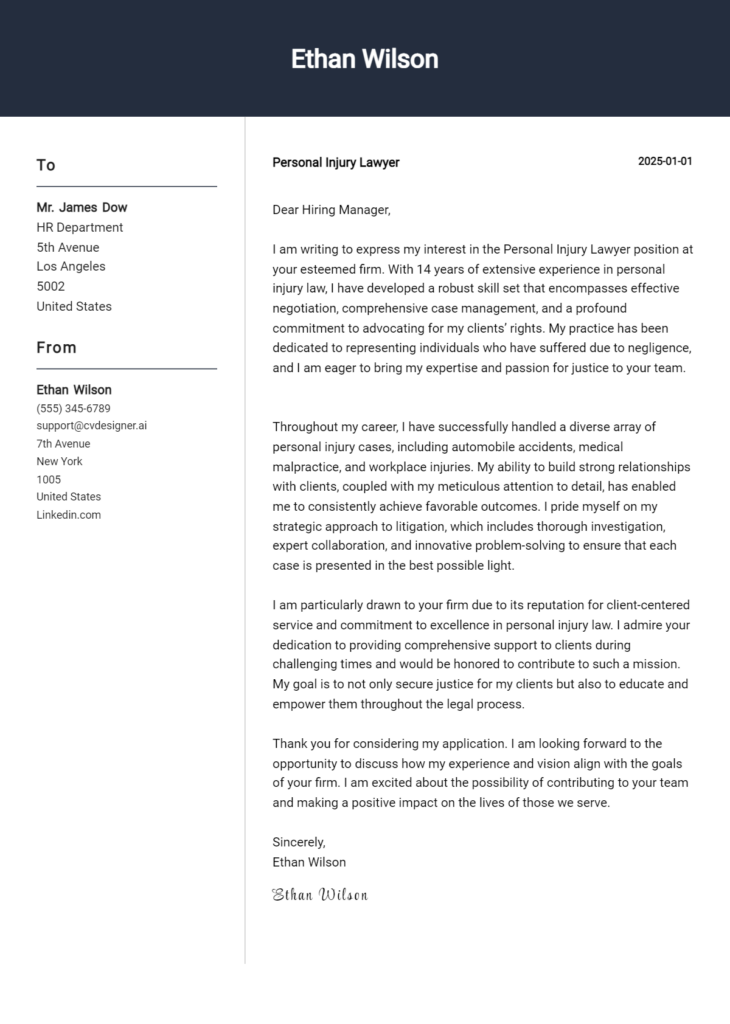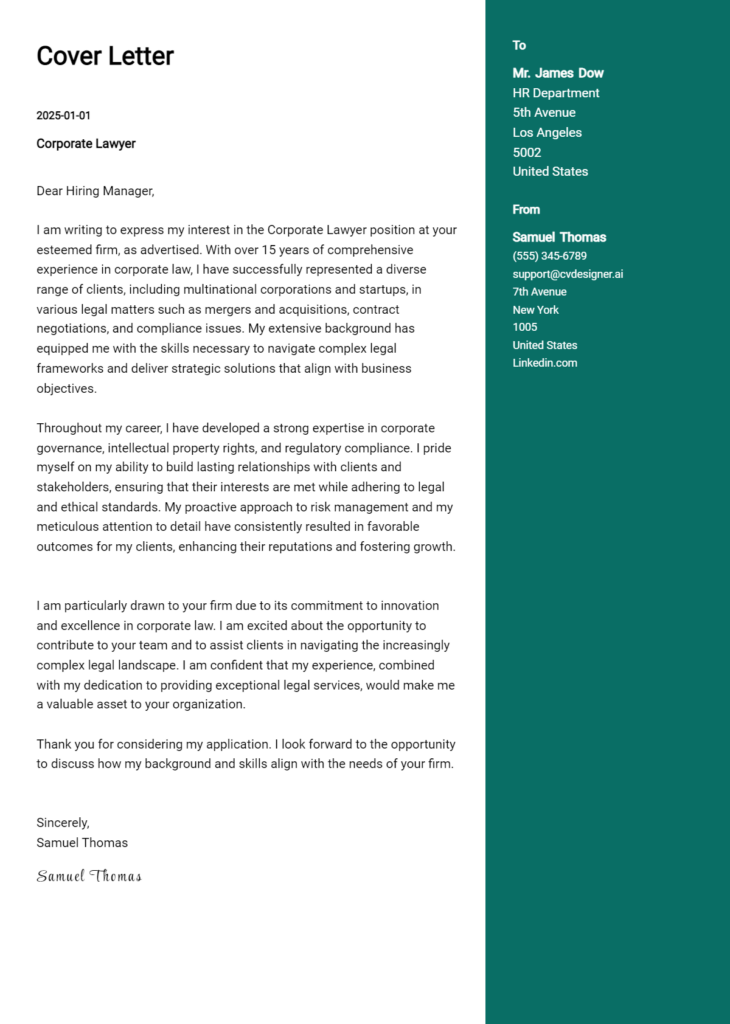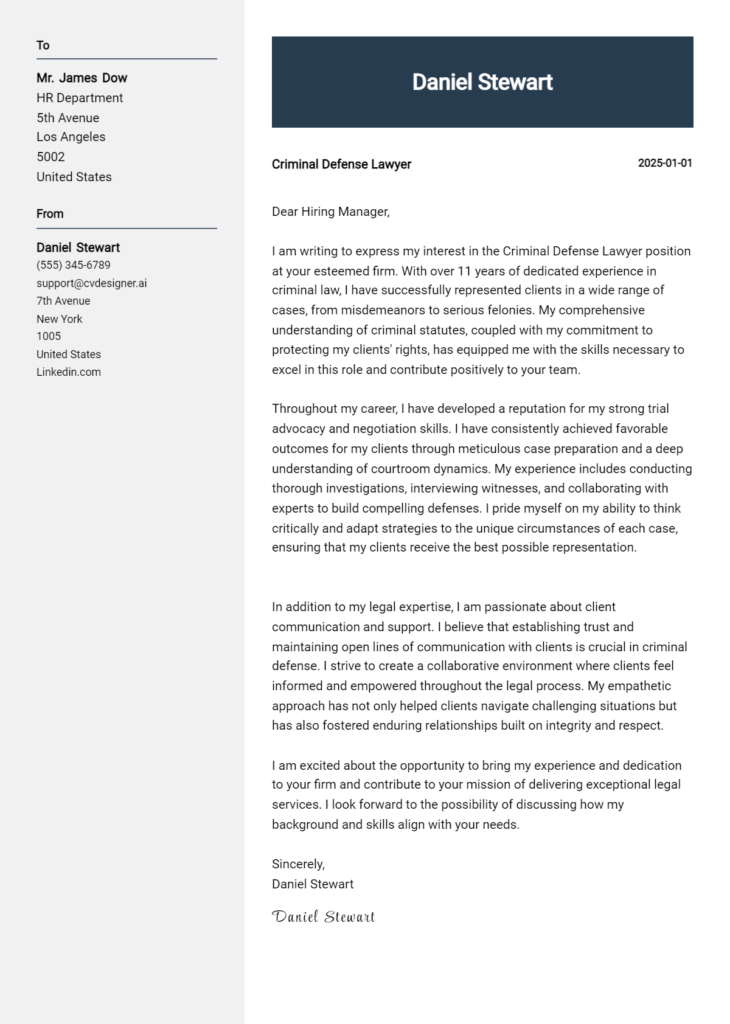Trademark Attorney Cover Letter Examples
Explore additional Trademark Attorney cover letter samples and guides and see what works for your level of experience or role.
How to Format a Trademark Attorney Cover Letter?
Crafting a compelling cover letter is essential for a Trademark Attorney, as it serves as your first opportunity to impress potential employers. The way you format your cover letter not only showcases your legal acumen but also reflects your meticulous attention to detail—a vital quality in the field of intellectual property law. A well-structured cover letter can effectively convey your qualifications and enthusiasm for the role while demonstrating your understanding of trademark law, helping you stand out among other candidates.
In this guide, we will outline the key components of a professional cover letter specifically tailored for Trademark Attorneys, including:
- Cover Letter Header
- Cover Letter Greeting
- Cover Letter Introduction
- Cover Letter Body
- Cover Letter Closing
Each section is crucial for presenting your credentials and professionalism. Let’s explore how to format each part to ensure your cover letter resonates with hiring managers in the legal field.
Importance of the Cover Letter Header for a Trademark Attorney
A well-structured cover letter header is crucial for a Trademark Attorney as it sets the tone for the entire document and reflects professionalism. The header should include your contact information, the date, and the recipient's details, ensuring clarity and easy reference for the reader. A clear header not only demonstrates attention to detail but also aids in establishing your credibility as a legal professional.
Here are examples of a strong and weak cover letter header for a Trademark Attorney:
Strong Example
Jane Doe 123 Trademark Lane Cityville, ST 12345 jane.doe@email.com (123) 456-7890 October 1, 2023 Mr. John Smith Senior Partner Smith & Associates 456 Legal Ave Lawtown, ST 67890
Weak Example
Jane D. 123 Lane City, ST 1/10/23 To Whom It May Concern
The Importance of a Cover Letter Greeting for a Trademark Attorney
The greeting of a cover letter is a crucial element that sets the tone for the entire application. It serves as the first impression the hiring manager will have of the applicant, showcasing their professionalism and attention to detail. A well-crafted greeting demonstrates not only respect for the recipient but also a personal touch that can make an applicant stand out. Avoiding generic greetings, such as "To Whom It May Concern," is essential; instead, taking the time to research the hiring manager's name or title can help create a connection. A personalized greeting reflects genuine interest in the position and the company, which can enhance the overall impact of the cover letter.
Strong Example
Dear Ms. Johnson,
Weak Example
To Whom It May Concern,
The Importance of a Compelling Cover Letter Introduction for a Trademark Attorney
A well-crafted cover letter introduction is crucial for a Trademark Attorney as it serves as the first impression a candidate makes on a hiring manager. This initial paragraph should not only capture attention but also express genuine interest in the position and briefly highlight key skills or accomplishments that align with the job requirements. A strong introduction sets the tone for the rest of the cover letter, making it essential for showcasing a candidate's qualifications and enthusiasm for the role. Below are examples of both strong and weak introductions to illustrate the difference.
Strong Example
Dear [Hiring Manager's Name], As a dedicated Trademark Attorney with over five years of experience in intellectual property law, I was excited to discover the opportunity at [Company Name]. My successful track record in protecting clients' brands—most notably securing trademark registrations for Fortune 500 companies—demonstrates my commitment to safeguarding their intellectual assets. I am eager to bring my expertise in trademark litigation and brand strategy to your esteemed firm, contributing to your clients' success and enhancing your reputation in the field.
Weak Example
To Whom It May Concern, I am writing to apply for the Trademark Attorney position at your company. I have some experience in law and think I would be a good fit. I hope you consider my application.
Purpose of the Cover Letter Body for a Trademark Attorney
The cover letter body for a Trademark Attorney serves as a vital component in presenting the candidate's qualifications and suitability for the position. It allows the applicant to narrate their professional journey, emphasizing specific skills and experiences that directly align with the requirements of the job. This section should highlight key projects or accomplishments, such as successfully managing trademark registrations or leading a complex opposition case, demonstrating not only legal expertise but also strategic thinking and problem-solving abilities. By effectively showcasing these elements, the candidate can illustrate their value to the firm and their potential contribution to its success.
Strong Example
I have successfully managed over 200 trademark applications, achieving a 95% approval rate, which has significantly contributed to my previous firm's reputation for excellence in intellectual property law. One of my proudest accomplishments was leading a high-stakes opposition case against a major competitor that resulted in a favorable ruling for our client, protecting their brand and market position. My ability to navigate complex legal landscapes and provide strategic advice has not only strengthened client relationships but has also led to a 30% increase in client retention and referrals within my practice area.
Weak Example
I have worked on some trademark cases and helped clients with their applications. I think I have good skills in law. I want to work for your company because I like your work and think I could be a good fit. I have some experience, but I am still learning.
Importance of the Cover Letter Closing for a Trademark Attorney
The closing of a cover letter is a critical component, as it provides a final opportunity to summarize qualifications, express enthusiasm for the position, and encourage the next steps in the hiring process. For a Trademark Attorney, this means highlighting relevant expertise in intellectual property law, demonstrating a passion for protecting clients' trademarks, and clearly inviting the employer to review the resume and consider scheduling an interview. A well-crafted closing leaves a lasting impression and reinforces the candidate's suitability for the role.
Strong Example
In conclusion, my extensive experience in trademark law, combined with my commitment to safeguarding clients' intellectual property, makes me an ideal candidate for the Trademark Attorney position at [Company Name]. I am genuinely excited about the opportunity to contribute to your team and help clients navigate the complexities of trademark registration and enforcement. I look forward to discussing how my background aligns with your needs and would welcome the chance to schedule an interview at your earliest convenience. Thank you for considering my application.
Weak Example
To sum up, I have some experience in trademark law and I think I would be okay for the job at [Company Name]. If you want to talk, that would be fine. I guess you can look at my resume if you want. Thanks for your time.
These tips will guide candidates in crafting an effective cover letter for a Trademark Attorney position. A well-written cover letter not only highlights your legal expertise but also demonstrates your problem-solving abilities, knowledge of the Software Development Life Cycle (SDLC), capability to work within a team, and a commitment to continuous learning. By integrating these elements, you can create a compelling narrative that sets you apart from other applicants.
Tips for Crafting an Effective Cover Letter for a Trademark Attorney
Showcase Your Technical Skills
Emphasize your legal knowledge, particularly in trademark law and intellectual property. Mention specific cases you've handled or projects you've worked on that illustrate your skills. Providing a brief overview of your technical expertise can establish your credibility right from the start.Highlight Problem-Solving Abilities
Use examples from your previous roles to demonstrate your analytical thinking and problem-solving skills. Describe a challenging trademark issue you faced and how you resolved it. This not only showcases your ability to navigate complex legal scenarios but also highlights your critical thinking capabilities.Demonstrate SDLC Knowledge
If applicable, reference your understanding of the Software Development Life Cycle and how it relates to trademark registration and enforcement. Explain how you have navigated legal precedents while working with tech companies or startups, showing your ability to bridge the gap between law and technology.Emphasize Teamwork
Collaboration is key in legal environments. Share experiences where you worked effectively within a team to achieve a common goal, whether in litigation, negotiations, or client consultations. Highlight your interpersonal skills and adaptability in working with diverse groups, which can enhance your appeal to potential employers.Express a Passion for Continuous Learning
The legal field is ever-evolving, especially in areas like trademarks and intellectual property. Mention any relevant courses, certifications, or workshops you have completed recently. This demonstrates your commitment to professional growth and staying updated with the latest legal trends, making you a valuable asset to any firm.
For more assistance, you can explore cover letter templates or utilize a cover letter builder to help structure your application effectively.
Common Mistakes to Avoid in a Trademark Attorney Cover Letter
Crafting a compelling cover letter is essential for standing out in the competitive field of trademark law. Avoiding common mistakes can significantly enhance your chances of making a positive impression on potential employers. Here are some frequent pitfalls to watch out for when writing your cover letter for a Trademark Attorney position:
Generic Language: Using a one-size-fits-all approach can make your letter forgettable. Personalize your cover letter by addressing the specific firm and highlighting why you're interested in their practice.
Focusing on Skills Instead of Value: Instead of merely listing your skills, demonstrate how those skills translate into value for the employer. Share specific examples of how your expertise in trademark law can benefit their clients.
Ignoring Formatting Standards: A poorly formatted cover letter can detract from your professionalism. Adhere to a clear and concise cover letter format to ensure readability and organization.
Neglecting Proofreading: Spelling and grammatical errors can undermine your credibility. Always proofread your cover letter multiple times or ask a colleague to review it for you.
Overly Lengthy Content: Lengthy letters can lose the reader's interest. Aim for a concise cover letter that effectively communicates your qualifications in a few short paragraphs.
Failure to Include a Call to Action: Concluding your letter without a call to action can leave the hiring manager unsure of the next steps. Politely express your desire for an interview or further discussion.
Not Researching the Firm: Failing to mention any specific information about the firm or its values can make your letter seem generic. Research the firm and weave relevant details into your cover letter to demonstrate your genuine interest.
By avoiding these mistakes and following best practices, you can create a standout cover letter that reflects your qualifications and enthusiasm for the role. For inspiration, check out some cover letter examples to guide your writing process.
Cover Letter FAQs for Trademark Attorney
How should I structure my cover letter as a Trademark Attorney?
Your cover letter should have a clear and professional structure. Start with your contact information at the top, followed by the date and the employer's details. Begin with a formal greeting, addressing the hiring manager by name if possible. In the opening paragraph, introduce yourself and state the position you are applying for. The body of the letter should contain two to three paragraphs highlighting your relevant experience, skills, and why you are a good fit for the firm. Conclude with a strong closing paragraph expressing your enthusiasm for the role and a call to action, inviting them to discuss your application further. Remember to keep the letter concise—ideally one page in length.
What key skills should I highlight in my cover letter?
As a Trademark Attorney, it’s vital to emphasize both legal expertise and interpersonal skills. Highlight your proficiency in trademark law, including your experience with trademark searches, registration processes, and enforcement actions. Mention any specialized training in intellectual property rights, as well as your ability to navigate complex legal issues. Additionally, showcase your research and analytical skills, as well as your attention to detail, which are critical in trademark litigation. Don’t forget to include soft skills like communication, negotiation, and client relationship management, as these are essential for advising clients and collaborating with colleagues effectively.
How can I demonstrate my passion for trademark law in my cover letter?
To convey your passion for trademark law, share specific experiences that have fueled your interest in the field. You might discuss a particular case you worked on that had a significant impact or a project that deepened your understanding of intellectual property. Mention any relevant coursework, certifications, or professional organizations you are involved with. Additionally, consider discussing the evolving nature of trademark law and how you stay current with trends, such as the rise of digital trademarks. This will demonstrate your commitment to the field and your desire to contribute to the firm's success.
Should I customize my cover letter for each application?
Absolutely, customizing your cover letter for each application is essential. Tailoring your letter shows that you are genuinely interested in the specific position and the firm. Research the firm’s focus areas, recent cases, and overall culture, and reflect this understanding in your letter. Highlight experiences and skills that directly align with the job description and the firm’s needs. Avoid generic statements and instead use specific examples that relate to the firm’s work. A customized cover letter not only sets you apart from other candidates but also demonstrates your dedication and preparedness for the role.
Build your Cover Letter in minutes
Use an AI-powered cover letter builder and have your letter done in 5 minutes. Just select your template and our software will guide you through the process.

